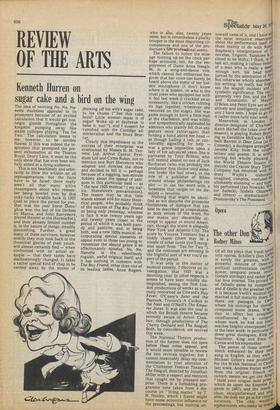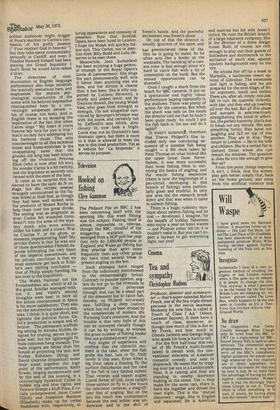Opera
The other Don
Rodney Eines
Of all the plays that Verdi tui-jo into operas, Schiller's Don Cw'iti is surely the greatest, with„:0 powerful mixture of three4".81 political confrontation (spiritlo. power, temporal power, revo tionary stirrings) and rather Ptii liar love interest. The private. ell, of Othello pales by compars°,1, and if Otello is the greatest oPIe it is because Verdi's musical stZut reached it full maturity there. ,PAI there are passages in Car's, where his strivings for throug"e, composed music drama, W981i rian in effect but comPle"er uninfluenced by a coMPu'id, whose work he had not hea4 reaches heights unsurpassed 0;4 in the later work: in particular Pr;d three great duologues, King 1.10 Inquisitor, King and Posa, P Carlos and his stepmother. is The power of these scenea,,,i much enhanced by their beRiii sung in English, as they were, 1, Michael Geliot's new produce _AtIqff for the Welsh National in Cated last week. Andrew Porter Wilrisgt from the original French te (which means we get the King, ” Hold your tongue, bold priestu, which so upset the Empress is genie in 1867) and the result clean, straightforward and sing' able. He does not go in for circurn locutions. The chic would-n` sophisticates who make up met°.
politan audiences might snigger at Posa's reaction to Carlos's confession of his guilty passion (" Your mother! God in heaven! ") but they take opera commendably seriously in Cardiff, and even if Frankie Howerd himself had been playing the Grand Inquisitor I don't think he would have raised a titter.
The directness of communication in English language performance also helps establish the mentally precarious hero, and emphasises the mature psychological construction of the scene with his beloved stepmother (distinguished here by a convincingly unoperatic swoon — his, of course, not hers). And in English there is no escaping the implication of the fact that when Carlos sings "My heart is yours forever/My love for you is true," that's no lady he's addressing but his baritone chum. The only counterweight to all this technical incest and homo-eroticism is the unappetising news that the gloomy old king has been knocking off the vivacious Princess Eboli (who is now after his son). No wonder Carlos is a bit twitchy, and the Inquisitor so severely concerned with the state of the land. It came as no surprise that he elected to have the auto da fe on stage, but the victims seemed strangely unconcerned as the fla mes licked at their feet, as though they had been well stoked with
the products of Messrs Roche to help them over the great divide. The ending was as enigmatic as ever: Carlos fell wounded (unto death?) into the arms of the mystery monk, who wore armour under his habit and a crown. Was he Charles V, or his ghost, or someone impersonating him? My private theory is that he was one of those downtrodden Flemish deputies infiltrating the very heart of the imperial powerhouse, and
my private conviction is that we must somehow get back to Schil ler's own chilling conclusion — that of Philip simply handing his son over to the Inquisition.
. The Welsh National cut the Fontainebleau act, which is all to the good. Schiller managed with out it, and Verdi's second thoughts were best: to have all the action concentrated in Spain is far more satisfactory. They also cut the insurrection scene—a mis take, I think; it is quite short, and tightens the political focus. Geliot's production is simple and ef fective. The permanent scaffolding setting by Annena Stubbs, designed for touring, serves its pur
pose well, but her lightweight female costumes hang uneasily. The
male singers are better than the female at projecting the text, and Forbes Robinson (King) and David Gwynne (Inquisitor) make their scene together the high point of the performance. Keith Erwen, singing exceptionally well by the end of the evening, is a convincingly hysterical Carlos in bubble wig and blue tights, and Terence Sharpe a bluff Posa, if vocally underpowered. Janet Coster (Eboli) and Josephine Barstow (Elisabeth) make up for verbal muddiness with, respectively, al
luring appearance and intensity of presence. Now that Scottish Opera have been lured to London, I hope the Welsh will quickly follow suit. This Carlos, not to mention their Billy Budd and Lulu, deserves to be seen there.
Meanwhile, Joan Sutherland has been enjoying a huge personal triumph in the Royal Opera's Lucia di Lammermoor. She sings the part phenomenally well, acts it better than anything else she does, and her diction is clearer than it has been. She is ably supported by Luciano Pavarotti, a sturdy and ardent tenor, and by Gwynne Howell, the young Welsh bass, who goes from strength to strength. I'm not altogether convinced by Bonynge's brusque way with the score, and certainly not by Zeffirelli's sets which, atrociously lit, now look a fright. Lucia may not be Donizetti's best dramatic opera, but there is more to it than is allowed to meet the eye in this tired production. Yet as a vehicle for ' La Stupenda ' it serves its purpose.



































 Previous page
Previous page